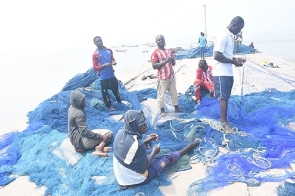 File photo: Some fishermen mending their nets
File photo: Some fishermen mending their nets
The national fishing closed season needs to be made mandatory for all fishing fleets operating in the country at the same time, the Scientific and Technical Working Group (STWG), of the USAID-SFMP programme, has advised.
The closure should “not be made for one fleet at a particular time and another fleet for another time”, the STWG said.
The STWG said the best period to observe the closing season in Ghana is August which is the peak month for the breeding for fishes.
There are three fleets of fishing in the country, involving the artisanal, semi-industrial (inshore) and the industrial artisanal which is the largest sector contributing over 70 percent to annual fish production while small pelagic fisheries constitute about 75 percent of the fisheries.
The STWG, made up of key individuals and researchers with in-depth knowledge of the fisheries sector, said the fishing closure also needed to be implemented in combination with effective enforcement of existing fishery laws on illegal, Unreported and Unregulated (IUU) fishing to achieve maximum impact of the closure on the sector.
Speaking to the Ghana News Agency on the side-line of the two-day annual meeting of the STWG in Accra, Professor Kobina Yankson, Chairman of the STWG, said the closed season must be “a closure for all fleets at the same time, while enough notices on the closure should be given to the fishers, and the import of the closure should be properly explained to them so that their expectations would not be misplaced.
He said the issues raised by the Group formed parts of its recommendations to government to help the country revamp its declining marine fisheries sector. Professor Yankson said “the definition of a closed season is to close fishing to allow the fish to reproduce and the best month for the reproduction of fish is in August”.
When the closure is done at the time of breeding, it would help people to feel the positive impact of the closure, that could be experienced in a year’s time after a particular closure period, Prof Yankson said. He argued that the fishing closed season were being observed in many other countries, including Morocco, Philippines, Mauritania, Senegal, Guinea, among others to revive all their fisheries sector.
Prof Yankson said the laws in the Fisheries Management Acts of Ghana, on light fishing, mesh size control, dynamite, chemicals, as well as Saiko fishing involving the transfer of “transshipment” of fish at sea from industrial trawlers to local canoes, must be critically enforced to ensure an improved fishing sector.
The Group also called on all stakeholders to intensify efforts at increasing the number of fishing holidays, which should be observed at specific periods, between July, August and September, to ensure maximum impact on the sector.
There is the need to continue efforts at identifying and implementing Marine Protected Areas (MPAs), as well as promoting the implementation of other controls such as total allowable catch (TAC) and total allowable by-catch. There was also the need to institutionalize a platform for exchange and use of scientific information for management of the fisheries, the STWG said.
Dr Najih Lazar, Senior Fisheries Advisor, Coastal Resources Center, Graduate School of Oceanography, University of Rhode Island, USA, said the STWG idea originated from the implementation of the USAID Sustainable Fisheries Management Project (SFMP) in 2015 to provide science-based management advice to ensure long-term sustainability of fish stocks based on the best available scientific information.
He said members of the STWG included staff of the Ministry of Fisheries and Aquaculture Development/Fisheries Commission (MOFAD/FC), academia, research institutions and industry players in the fishery sector.
The STWG is an ad hoc group of Fisheries Experts with a mission to provide science-based management advice in the implementation of the National Fisheries Management Plan and other management interventions to ensure long-term sustainability of Ghana’s fisheries resources.
Dr Lazer said the USAID-SFMP has recommended to government the need to adopt and formalised the STWG, which was “100 per cent Ghanaian institutions” as the SFMP projects ends in July 2020, so they could continue to contribute meaningfully towards the sector, as required by the Fisheries Act.
The annual meeting afforded the group the platform to review the report of the current stock assessment of the small pelagic and demersal fish and also discuss the biological and socio-economic impacts of the 2019 closed season implemented for the artisanal and inshore fisheries.
The meeting also discussed processes initiated to mainstream the operations of the STWG into the planning and budgeting of MOFAD/FC, the governmental entities mandated to manage the fisheries resources of Ghana and coordinate policies related to the sector.